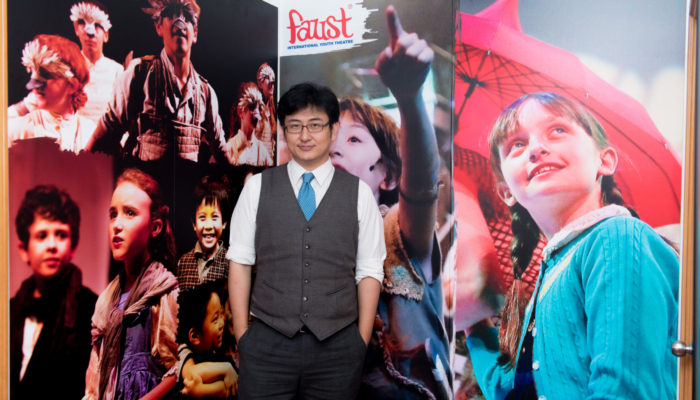Keon Lee (Sha Tin College 1998′)
Everybody has a “toughest year ever”. For playwright and stage director Keon Lee, that year happened to be 1999. He remembers it vividly.
Just one semester into his studies at London’s Royal Holloway University, one of Britain’s top schools for drama and theatre, Keon and his family back in Hong Kong became one of the many victims claimed by the Asian financial crisis and subsequent IT bubble burst.
The financial troubles that followed hit the Lee family hard. Unable to pay the rest of his tuition fees, Keon was forced to end his studies prematurely. “When I left England, I knew there was the possibility that I was not coming back,” said Keon, a Beacon Hill School and Sha Tin College graduate. “It was immense disappointment.”
Keon retreated to his native country of South Korea that winter, where he holed out with relatives for the rest of the year. “It was cold, I was away from my friends and my parents. I was away from my support network. Since my Korean was never up to scratch, it was just a very foreign place to me.”
But the boy never gave up. There, he applied his mastery of the English language to teaching. After a year, he had scrimped and saved up enough money to return to the SAR to complete a bachelor’s degree in English and Comparative Literature at the University of Hong Kong. The prestigious institution was also where he met his wife, Tanya, a visiting student from Australia. With their two children Sam, 9, and Olive, 4, they now live happily together in Yuen Long.
Keon now heads the Faust International Youth Theatre in Sheung Wan, where he champions and trains more than 700 youngsters – more than half of which are English Schools Foundation pupils – in the fine art of theatre. He joined the company as an assistant in 2001, the year after he graduated from HKU, after being introduced by none other than a fellow ESF alumnus. “Yes, my life had come full circle in a way,” he laughs. His reconnection with ESF and ESF students runs even deeper with Faust courses and workshops held at many ESF schools.
Apart from managing the operations of the company, Keon is also a playwright. His specialty is taking classics and rewriting them with a modern twist that feature clear themes such as role models and teamwork that can help instill positive values and promote character-building in children. “[The objective] is not to churn out child stars but kids who are confident, want to serve a higher purpose and not themselves.”
Many of his plays for example feature modern day high school students, but as Shakespearean characters. Others take on classic settings and themes but involve modern day props and references. “There is no purpose of telling the story of Romeo and Juliet again if you can’t tell it in a different way,” he says. “Some people think creativity is finite. But it’s not.”
An education in theatre, Keon stresses, is not just about becoming a performer or artist. “It gives children and students a way to express themselves, a way for them to appreciate the world around them,” he said. “It gives them stronger self confidence, ability to talk to others, present themselves and become a more well-rounded person.”
Keon says he’s seen tangible change in students. “I once worked with a shy Korean child who didn’t want to be on stage at all,” he recalls. “Eventually, we gave him a non-speaking role in the play. After the production, I thought he wasn’t coming back. But eventually he did and was beginning to speak. His confidence continued to grow.”
The proof is in the person too. The Keon of 2016 is a towering figure with a booming voice. His statements are eloquent, punctuated with the occasional anecdote or witty joke. But the Keon of the past wasn’t always like this.
Shy and a bit on the chubby side, Keon’s early primary school days at Beacon Hill School, were spent as a reserved child, lacking in self confidence. This all began to change in primary five. It was Ms Oysten’s class that first exposed Keon to drama. He took on his very first performing role as an arctic explorer – a classmate had stolen his role as Indiana Jones – in a class play for assembly.
“I had to pretend to trudge through snow in the middle of the aisle going up to school platform,” Keon recalls fondly. “This was the humble beginning.”
But it was year seven at Sha Tin College, where Keon found true enlightenment and love for the subject. It was Ms Vittachi, he recalls, who had “blown my mind in terms of what I could do with drama”. There, he was introduced to King Lear, performing greats such as Charlie Chaplin and forms of theatre such as commedia dell’ arte.
“I learned so many aspects of drama and theatre through her,” he said. “She showed me I could be funny and not so shy … she really brought me out of my shell.” Other Sha Tin College teachers along the way would continue to fuel his passion and grasp of drama and literature. Today, Keon hopes to instill the same sort of values and experiences in his students.
Drama and literature helped Keon overcome tough challenges in his life. It also helped shape it. As with every crisis, there is opportunity. And for Keon, potential tragedy – in figurative terms – was channeled into eventual triumph.
The tale of Keon’s “toughest year ever” may not be the most dramatic, given the millions across Asia that year with unluckier stories to tell, but the label is somehow befitting of the man, who has dedicated his life to the stage and the performing arts. Or put another way, in the timeless words of William Shakespeare: “all the world’s a stage, and all the men and women merely players”.









